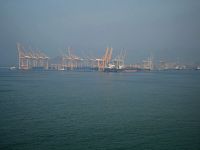Israel has been accused of "pandering to the demand for racial segregation" after the country's defence minister issued a directive that bans Palestinian workers from travelling on Israeli run bus lines in the occupied West Bank.
Thousands of workers are currently able to take the same buses as Israelis, which stop at various settlements before arriving at the highly secure Eyal Crossing.
There, they undergo security checks and swipe a biometric Identity card before continuing to their workplace in mainland Israel.
While the workers are not allowed to sleep in Israel, at present they can hop on buses and return home through various border crossings.
But under new rules introduced by Israel's defence minister Moshe Ya'alon, those making their way to work will not be able to board publicly owned buses to the checkpoint, according to Israel's Haaretz newspaper.
Instead they will have to make their own arrangements which could include two Palestinian only bus lines launched by Israel in March.
They will also be forced to return home via the Eyal Crossing instead of the multiple crossings currently available.
Critics have accused Ya'alon of bowing to pressure from Israeli settler groups in the area, who have long campaigned for a ban. The move has also been likened to apartheid.
Israeli human rights group B'Tselem said in a statement on their website: "Minister Ya'alon is not content with merely moving Palestinians to the back of the bus, but means to keep them off buses altogether."
They added: "It is time to stop hiding behind technical arrangements such as the demand that Palestinians return to the West Bank through the same checkpoint they entered Israel and admit this military procedure is thinly veiled pandering to the demand for racial segregation on buses."
The head of the Palestinian trade unions Shaher Saad also said it could prompt thousands of workers to resign from their jobs.
He added: “The separation of bus lines was done in the past by racist regimes, and it should not be acceptable in this state."
However, a spokeperson for the defense minister’s bureau told Haaretz that the changes would not prevent Palestinians from going to work.
They said: "This is purely a security-related matter, and its purpose is to supervise the entries and exits into Israeli territory, thereby reducing the chances of terror attacks inside Israeli territory.”








